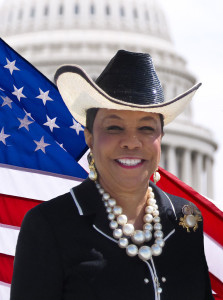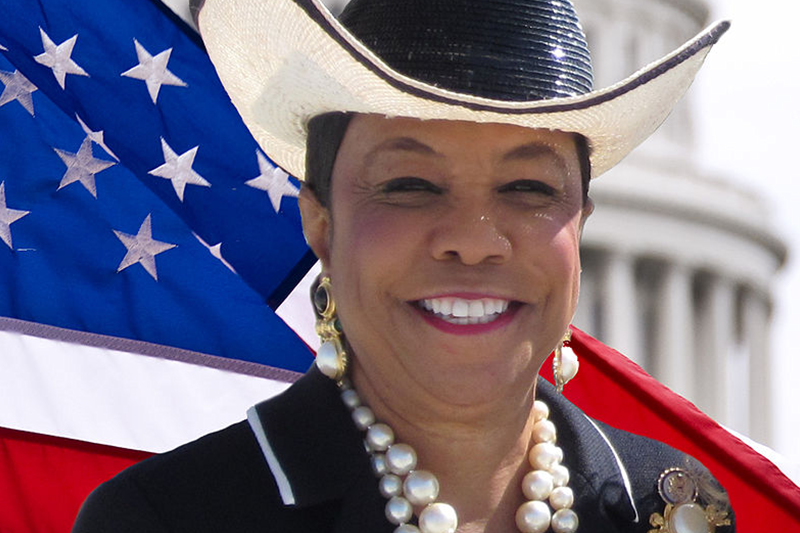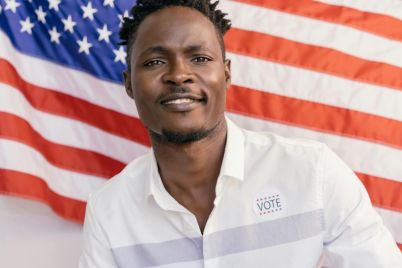Congresswoman Frederica Wilson
By Dr. Yvonne Scruggs-Leftwich
Black women icons, many of them now in a shared state of permanent repose, still served as models for those of us who remain on earth. But as new and less familiar national threats and obstacles challenge our families, communities and us as black women, we must assure that we update our leadership examples.
We must publicly and repeatedly acknowledge additions to this expanding reservoir of talented, dynamic, dedicated black women who now are leaders–in their own right–and have added strength to our country and our communities.

Congresswoman Frederica Wilson
Congresswoman Frederica Wilson is one such contemporary breach stander for blacks in crisis. She was the black woman leader at the side of Sargent La David Johnson’s wife and family after the heroic soldier was killed in action in African.
Missing for days and finally found, his remains were returned to his native land, America. His grief-stricken family was nurtured through this horrible crisis by Congresswoman Wilson. Apologize, Mr. Chief of Staff Kelly!
The template for identifying leaders and examples of success, power and influence among African-American women has gradually shifted, and the venues in which black women make their most significant impacts have changed and evolved.
In the era in which many of the black icons matured, gained prominence and rose to leadership, there often were social service institutions and non-profit-type organizations. Often, they were organized, community-based facilities such as settlement houses and church centers or opportunities for leadership in social service programs.
Gender discrimination barriers remain–more impenetrable for black women than for most non-black women. This suggests that those positions, institutions and environments in which black women leaders have found opportunities and advancement in the past offer examples that should at least be considered and evaluated for their potential by younger emerging leaders.
In my last book, “Sound Bites of Protest,” a chapter is devoted to a national political institution, the U.S. House of Representatives and to the African-American women who serve there. The chapter “Black Women Are Credible Presidential Candidates” presents the very rich pool of black women politicians who served in the House and United States Senate also.
Highlighted in this essay are 15 remarkable women who were members of the Congressional Black Caucus when the book was published in 2008.
Some people, reading this today, might stage whisper: “That’s your list, Scruggs-Leftwich! I have my own names to add.” So, do that! And celebrate their leadership, and the daily contributions they make to keep America great.
Remember to send strength to Congresswomen Wilson, Congresswomen Maxine Watters and Senator Kamala Harris of California who, since the November election ending Barack Obama’s final second term as president, have been told to “sit down” (and shut up) by white men in congressional positions of power, which they flaunt through their condescending behavior.
Also, send a special “sister-shout” to white lawyer Congresswoman Elizabeth Warren of Massachusetts, whose brainy determination has earned disrespect and denigration comparable with that directed at her black women congressional colleagues.
Community organizations and local service-providing institutions, as incubators for African-American women leaders’ grooming, are less frequently in place locally. Easy access to preparation by expert leaders who can become role models is logistically or economically challenging and is made more remote by social communications technology and other obstacles to most effective hands-on mentoring.
An analytical look, which the chapter in “Sound Bites of Protest” takes, involves the United States Congress, as viewed through the prism of the Congressional Black Caucus.
The core concern that has driven my thoughts and writing in this essay as well as over the many years, which the advancement of African-American women has preoccupied my research, commentary and advocacy, has been this: Women–including black women–can become anything they choose to become, given two conditions:
-
Opportunity and access free from artificial barriers and deliberate obstacles
-
All humans, including black women, have to be able to imagine their possibilities. We need to be able to have some idea, no matter how faint, of what it will be like to become what we envision–someway, somehow–even if only a dream.
The list of icons on whose shoulders we stand must now be expanded to include more contemporary versions of successes, power and influence, with dignity. We must mention them, by name, often, when they are present and when they are not.
We must require that our detractors and adversaries do not falsely assume that since some black women’s heroes have passed on, the causes for which they advocated, championed, and stood in the breach are now left unattended, without the protectors, champions and guides through the sandstorms of time. Nothing could be further from the truth.
The new technologies see, hear and make a record of EVERYTHING. Some next-generation breach standing shoulders are already identified. Watch the social media reports and posts.
Also, you might be interested in visiting the Congressional Black Caucus website to learn the names, rich preparation and community service of other CBC members who, like Congresswoman Wilson, Congresswoman Watters and all of our national breach standers, who are already advocates, leaders and performers of good works.
My next essay will celebrate the role of the black press and media in African American progress. HUGE!! Stay tuned! Journalist and provocateur Ida B. Wells Barnett leads that march.
About the author
Dr. Yvonne Scruggs-Leftwich is a political scientist, public policy specialist and a journalist whose writing awards include: Washington-Baltimore Newspaper Guild’s “Bernie Harrison Front Page Award” and the Association of Black Journalists’ Griot Award for Commentary. She is the author of several books and numerous commentaries.
She earned a yearlong Fulbright Fellowship to Germany and was inducted into the Hall of Fame of St. Petersburg, among other accomplishments. Dr. Scruggs- Leftwich earned her Ph.D. from the University of Pennsylvania at Philadelphia, was the deputy mayor of that city and the Commissioner of Housing for New York State, in Governor Mario Cuomo’s Cabinet.
Post Views:
6,530









